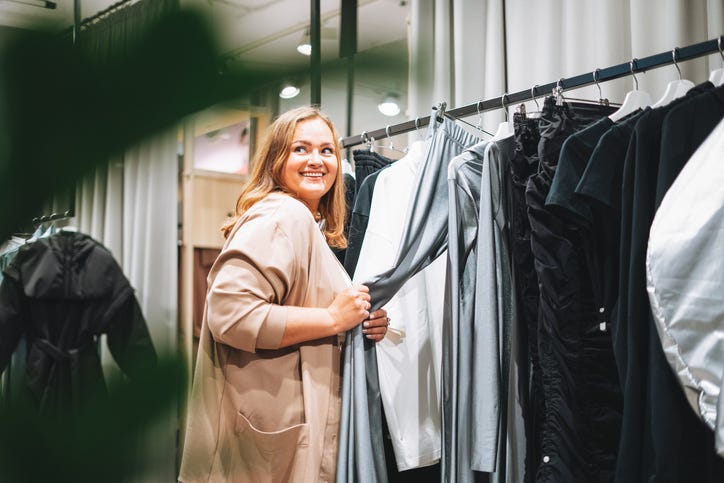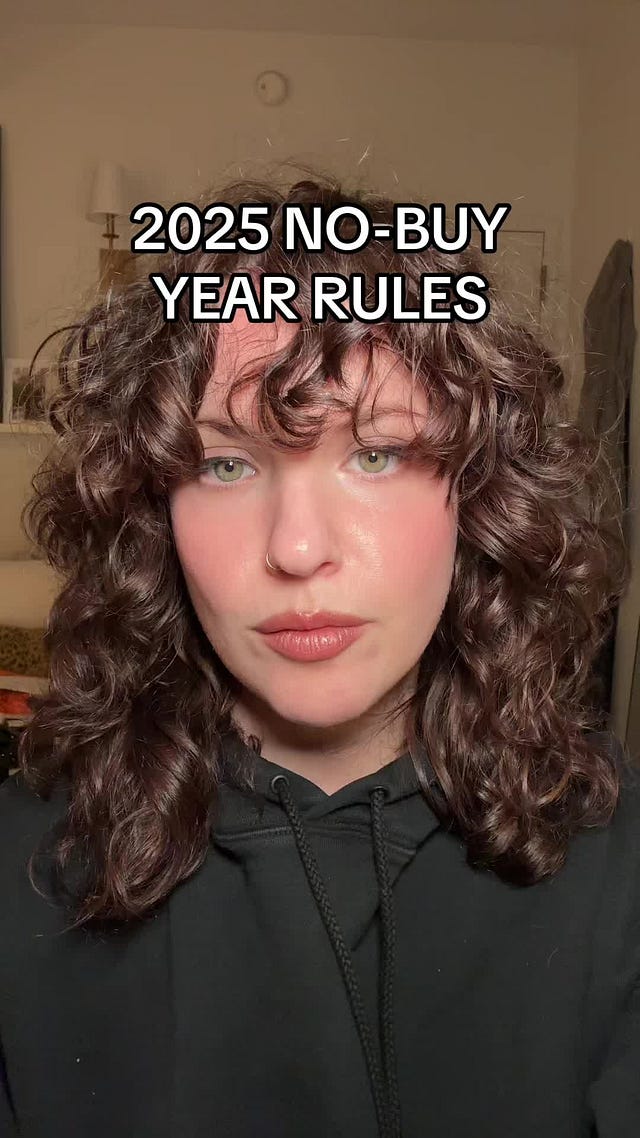A few weeks ago, beloved Gen Z Youtuber Emma Chamberlain (once called “the most important youtuber today” by Taylor Lorenz in The Atlantic) posted a YouTube video titled “i got rid of (almost) everything” about her epic closet cleanout.
The video starts with a montage of old haul videos and a voiceover where she describes her mindset shift:
I really thought that having a closet full of clothes would bring me joy, would inspire me. I thought I would be infinitely more fashionable and stylish. I could not have been more wrong, actually.
Honestly, relatable. I have been struggling with my own wardrobe, which has outgrown its container (my closet). And as Emma implies, it sometimes feels like having a lot of clothes makes it harder and not easier to get dressed every day.
If you like reading about the best sweatshirts, adventures in capsule closets, and anti-Trump aesthetics, please become a paid Big Undies Subscriber.
Meanwhile on Tiktok, my For You Page has been taken over by people talking about doing “No Buy 2025” and committing to various levels of anti-consumerism in the coming year.
Despite its popularity this moment, the idea of doing a No Buy year is not new. Fast Company wrote about the ‘No Buy’ movement in June, interviewing someone who first did this 6 years ago. Others have done No Buy years to pay down debt.
But I’ve seen many posts mentioning No Buys for next year on Substack, too. Jess Kirby, author of the wonderful
, did a No Buy year last year and is doing it again in 2025. Leslie Stephens, author of , hinted that she may be doing one, too. And is doing a spending ban. and I have been considering our own version—more about this on the Burnt Toast podcast in January.I think many things are coming together to make No Buy so popular for 2025: The reelection of Trump; Netflix’s Buy Now documentary about the consequences of consumerism; growing anxiety about climate change. I’m no longer seeing anyone talking about 4B (and Google trends reflects this), instead my FYP is full of people explaining their No Buy rules. Deinfluencing has been popular for a couple years now. Maybe No Buy 2025 is its natural progression.
I am certainly not immune to a zeitgeist! I want to feel optimistic about my personal choices creating change. And I do believe that collective action can have a meaningful impact, especially with a unifying message.
But as someone who often finds myself rebelling against restriction, I have been reflecting on whether doing some level of No Buy for myself is realistic. Will curbing my shopping now lead to overspending later? For some people it certainly does, as Gillian on
bravely admitted in a post called “Here's the thing nobody tells you about a No Buy Year...”I also appreciated
’s Reflections on a Low-Buy Year about using guardrails rather than hard and fast rules, treating her goal of buying only 5 new things as “a prompt that helped me shop more thoughtfully, rather than a restriction or a form of punishment for overconsuming.”If I commit to a No Buy, what will replace the comfort of e-commerce scrolling or the dopamine hit of opening a new package? I think for so many of us, shopping is a self soothing and problem solving strategy. And while it should not be the only way we self soothe or problem solve, I want to acknowledge that it can serve a purpose.
It’s also hard for me, a fat person, not to connect the popularity of reducing our consumption with dieting and weight loss. First the year of Ozempic in which everyone is eating less and then the year of No Buy in which everyone is consuming less? Are we just trying to make ourselves take up less space? I cringed at the end of Emma Chamberlain’s closet cleanout video when she said, “I felt like a gluttonous pig…. And to be honest, I am a gluttonous pig.” I did try to count how many shirts Emma had left in her closet after her purge and lost track at 60. Maybe she’s just playing it up for the views, but the disgust she talks about feeling sounds so much like shame.
One thing I really like about the No Buy 2025 TikToks and Substack posts I’ve been seeing is that rather than following the same strict guidelines, everyone seems to be making up their own rules. For some people it’s not shopping on Amazon, for others it’s not buying books, plants, objects for the home. Ideas on TikTok range from no new skincare and no fast fashion or no Afterpay or no accumulating multiples. Some people are only buying things secondhand. I also likes that some people make lists of things they are allowed to buy, because that feels less punishing to me. We do live under capitalism after all.
Still, l wonder about the romanticization of underconsumption. I feel like slow fashion sold me the promise of fewer, better made garments that would last a lifetime. But pants wear through in the thighs and I no longer feel like myself wearing the oversized linen smocks I bought thinking those styles were timeless. The hope that buying fewer, better could solve overconsumption is fading—or maybe it’s morphing into the hope that with strict rules around spending we may find some measure of control in an increasingly chaotic world.
As for me, I am still figuring out what my shopping habits will look like in 2025. I’ve committed to not buying from Amazon in January and I may expand that a little bit. I definitely want to come up with a list of yes-buy things so I don’t feel like I’m only focused on limiting.
But it’s hard to really devote myself to these goals when I know that change is inevitable. My body will change, my self perception will change, my lifestyle will change, the climate will change. And yet I still need to clothe myself! How do I make do with what I already have while facing an unknowable future? I know that no matter what I do or do not buy today or this year, I will always find something new to want.










A very good read! Personally, I am in favour of a Less-Buy 2025 instead of a No-Buy 2025. I support the 5for2025 idea, committing myself to buying no more than 5 new items of clothing (unlimited number of thrifted items). It's not as strict as the no-buy commitment and ensures that I think long and hard about every purchase I make.
I just wanted to drop in to say that it is truly very easy (for me at least) to not shop on Amazon. I have never been a member or a regular Whole Foods shopper & I don't have any electronic listening devices in my house (other than the phone in typing on), so that may have helped. I have only purchased things on Amazon that I truly need & mind-bogglingly enough, cannot find anywhere else (like a neutral ph cleanser for my tiles--I tried every hardware store, searched online & truly could not find it, so I ordered the largest volume I could to last me the longest time). You can find almost everything else in a store or from a different retailer. It seems unlikely you truly need it to arrive on your doorstep immediately. Amazon doesn't even have a good interface or user experience. I feel terrible every time I see those drivers racing to deliver packages. Give it a try-- that is an eminent do-able & also emotionally satisfying restriction.
As for the rest, I definitely recommend a list of things you're really looking for or some other guardrails that fit your lifestyle. Otherwise it feels very much like a crash diet where you then go overboard in the end. Best of luck with whatever you decide!